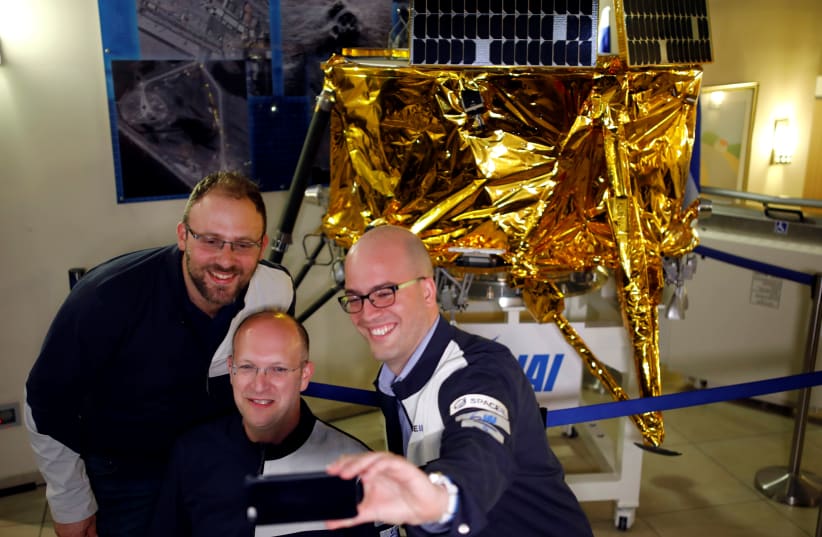While SpaceIL’s attempt to land the Beresheet spacecraft on the Moon on Thursday ended in disappointment, the nonprofit organization will receive a $1 million “Moonshot Award” from the XPRIZE Foundation for its achievements.
Founded in 1995, California-headquartered XPRIZE designs global competitions to incentivize the development of technological breakthroughs that accelerate humanity toward a better future.
The Moonshot Award was established last month to recognize teams demonstrating the achievement of a “moonshot” technological feat outside the parameters or time-frame of an XPRIZE competition, including the $30m. Google Lunar XPRIZE which led to the establishment of SpaceIL.
“SpaceIL’s mission not only touched the Moon, it touched the lives and hearts of an entire world that was watching,” said XPRIZE founder and executive chairman Peter Diamandis.
“The legacy SpaceIL will have on the future of the space industry is significant. This team’s ability to build a lunar lander for $100 million and less than 50 engineers is remarkable, a leap forward towards affordable and accessible space exploration. Congratulations to Morris Kahn, their primary benefactor, and the entire SpaceIL team for all their accomplishments - we are so proud.”
XPRIZE said Beresheet’s successful entry into lunar orbit and attempt to land on the lunar surface, the first by a privately-funded entity, marked “a new era in space exploration.”
Millions around the world tuned in live on Thursday to watch the spacecraft, an ambitious project developed by SpaceIL together with Israel Aerospace Industries (IAI), descend to the Moon’s Mare Serenitatis (Sea of Serenity) as the State of Israel sought to become only the fourth member of a prestigious club of nations to complete the formidable task of landing a spacecraft on the lunar surface.
SpaceIL lost contact with the spacecraft minutes before it was due to complete the historic landing – a feat previously achieved only by the United States, Russia (then the USSR) and China – after an epic seven-week, 6.5 million km. journey since Beresheet blasted off from Cape Canaveral, Florida on board a SpaceX rocket on February 22.
Once in position to descend, the landing maneuver – split into two phases of decreasing horizontal velocity and then vertical velocity – commenced but failed to land after a technical issue caused the spacecraft’s main engine to stop, leading to a loss of altitude and an unavoidable crash landing.
According to initial assessments, the technical issue occurred at 14 km. above the moon. While the spacecraft overcame the issue by restarting the engine, its vertical velocity was already too high to land as planned.
At 150 meters altitude, when connection with the spacecraft was lost completely, the spacecraft was recorded as plummeting at 500 km/h toward the Moon’s surface.
Comprehensive tests will be conducted next week, SpaceIL and IAI said, to gain a better understanding of the cause of the crash.
“As a testament to the team’s passion and persistence, we are presenting this $1 million Moonshot Award to the SpaceIL team at our annual Visioneering Summit in October 2019, with the hope that they will use these funds as seed money towards their education outreach or Beresheet 2.0, a second attempt to fulfill the mission,” said XPRIZE CEO Anousheh Ansari.
“We are so proud and humbled to have served as the catalyst for this mission, not just to further private space exploration, but to increase access to education, career opportunities, and role models in this field, something that is very much in line with the values of the XPRIZE Foundation.”
Future Moonshot Awards, the foundation said, will be considered in other domains, recognizing both literal and figurative moonshots.
The motivation to inspire younger generations to pursue scientific studies, Israel’s version of the “Apollo Effect,” has remained constant since SpaceIL was co-founded eight years ago by Yehonatan Weintraub, Yariv Bash and Kfir Damari.
Speaking to reporters after the unsuccessful landing, Weintraub spoke not of disappointment but of the importance of education.
“I want to turn to the kids that might be watching - yes, we didn’t reach the moon in one piece but engineering and sciences are hard,” he said.
“Sometimes it doesn’t work the first, second, third or even the fourth time, but eventually it will work. I want to encourage you to continue studying engineering and sciences, because one day you will be able to reach the moon, the stars and beyond.”

